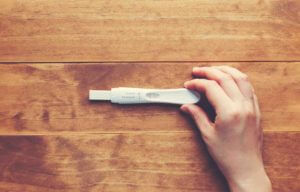The use of monk’s pepper is also said to be effective in cases of unfulfilled desire to have children. If the longed-for pregnancy does not work out, it may be due to a luteal weakness or a disturbed hormone balance, for example.
Many doctors and pharmacists recommend monk’s pepper as a gentle alternative to classic medications. The experience of many women suggests that the herbal remedy is effective.
Would you like to learn more about the effects of monk’s pepper on infertility, PMS or luteal insufficiency? We offer you comprehensive information about this fascinating help from nature.
Table of contents
Monk’s Pepper: Help With Luteal Insufficiency And Unfulfilled Desire To Have Children?
Monk’s pepper is considered an effective medicinal plant and is said to contain active ingredients that have a positive effect on the pituitary gland.
It is said to have positive effects on hormone balance in irregular menstrual cycles, and many women turn to this natural remedy if they are unable to conceive.
Here you will learn important information about the effect of monk’s pepper as well as its uses, history and origin of its name.

Monk’s Pepper – What Is It?
Behind the somewhat unusual name monk’s pepper (botanically: Vitex agnus-castus) is a plant species that occurs mainly in the Mediterranean region and in western Asia.
It reaches a height of up to four meters and grows primarily near the coast and on river banks. Characteristic is the shrubby growth, lanceolate leaves with dark green leaf top.
In the flowering period from June to August, small flowers are formed, which have a delicate fragrance and appear in white, purple, blue or pink coloration.
Colloquially, the monk’s pepper is also called chaste mud or chaste tree. In Greece, the plant was considered a symbol of chaste marriage.
For a long time, the brownish-black fruits were said to have a weakening effect on the sex drive.
In the medieval monastery gardens, the plant was therefore increasingly planted and the monks used the pungent tasting fruits as a spice, from which they hoped a lust-inhibiting effect. This assumption has not yet been scientifically proven.
When Is Monk’s Pepper Used?
The ripe fruits of monk’s pepper are dried and used primarily to treat PMS and menopausal symptoms.
In many countries, the plant is now highly valued in gynecology and is used as a ready-made medicine. Monk’s pepper can be administered for:
- PMS (Premenstrual Syndrome).
- Menstrual irregularities (menstrual tempo abnormalities).
- Desire to have children.
- Regulation of hormonal balance
- Painful breasts (mastodynia).
- Menopausal symptoms.
The fruits of monk’s pepper contain between 0.15 and 1.8 percent essential oil.
Among other components, it contains sabinene, 1.8 cineole and alpha-pinene. Furthermore, tannins, flavonoids, dierpenes and iridoid glycosides (especially aucubin and agnuside) are among the ingredients.
Treatment Of PMS – Monk’s Pepper And Co
Many women regularly suffer from various psychological and physical complaints in the period before menstruation. The symptoms always occur in the phase between ovulation and menstruation.
Around 20 to 40 percent of all women of childbearing age suffer from mild premenstrual symptoms, and around five percent have symptoms that require treatment.
In the case of particularly severe forms of PMS, this not infrequently leads to severe impairments in everyday life.
The causes of PMS are still largely unclear. New studies suggest that the neurotransmitter serotonin plays an important role in the development of the syndrome.
It is possible that various factors disrupt the regulatory circuits of the nervous system and thus influence its reactions to hormonal stimuli.
Scientists assume that, in addition to hereditary predisposition, lifestyle habits such as lack of sleep, too little exercise, alcohol and nicotine consumption and stress also act as triggers.
A particularly severe form is premenstrual dysphoric disorder (PMDS). It is associated with severe mood swings, irritability, dejection or inner restlessness.
Basically, PMS can cause many complaints, including for example.
- Exhaustion, general fatigue.
- Sleep disturbances.
- Dizziness.
- Digestive disorders (constipation, flatulence, etc.).
- Abdominal and/or back pain, cramps.
- Low spirits, inner restlessness, irritability, etc.
- Circulatory problems.
- Skin blemishes.
- Weight gain.
Monk’s Pepper: Effect And Use In PMS
Due to the variety of possible symptoms, there are different ways to treat it. The choices range from lifestyle changes to the administration of calcium and magnesium to acupuncture or progesterone therapy.
Painkillers are used for abdominal pain, and many women swear by St. John’s wort and monk’s pepper.
In 2018, the Herbal Medicinal Product Committee (HMPC) published a comprehensive monograph on Monk’s Pepper & Effect on PMS.
This lists three dry extracts and one tincture that are classified as traditional herbal medicinal products. One dry extract received a well-established use rating and is approved for the treatment of premenstrual syndrome.
Unfortunately, the monk’s pepper effect on PMS has not yet been conclusively scientifically investigated, so there is no real proof yet.
Nevertheless, many doctors and pharmacists recommend monk’s pepper for the treatment of symptoms. The herbal remedy is said to have a stabilizing effect on hormone balance.
It is assumed that it has an effect similar to that of the messenger substance dopamine and contributes to the normalization of prolactin secretion.
Monk’s Pepper And The Desire To Have Children
You desperately want to have a child but pregnancy just won’t happen? Then monk’s pepper can also be a great help if you want to have a child.
If you have an irregular cycle, monk’s pepper can exert its effect and inhibit the release of prolactin. This hormone is produced in the pituitary gland and is particularly responsible for promoting milk production.
An inappropriately high prolactin level is known as hyperprolactinemia and can lead to irregular menstrual cycles, infertility and ovulation inhibition.
As an alternative to medication, some doctors recommend taking monk’s pepper to help regulate prolactin levels.
Does Monk’s Pepper Help With Luteal Insufficiency?
One of the most common reasons for infertility is luteal insufficiency.
During a normal menstrual cycle, the corpus luteum forms in one of the two ovaries after ovulation and is responsible for the production of the hormone progesterone (corpus luteum hormone). It is indispensable for the build-up as well as the blood supply of the uterine lining.
If the corpus luteum is weak, too little progesterone is produced and this has a significant effect on your fertility. In this case, doctors speak of hormonally induced infertility.
The implantation of a fertilized egg is not possible due to the disturbed hormone balance, often ovulation is already prevented. If pregnancy does occur, there is an increased risk of miscarriage.
In the case of a progesterone deficiency due to luteal insufficiency, various symptoms may be present. These include, for example:
- Second half of the cycle is shortened (12 days or less).
- Intermittent bleeding in the second half of the cycle.
- Basal body temperatureincreases slowly or in stages.
- Painful breasts.
- Myomas and ovarian cysts.
- Infertility.
- Early miscarriage.
- PMS symptoms.
- Other symptoms such as headaches, hair loss, irritability, etc.
The shortened half of the cycle is considered the main feature of luteal insufficiency. You should note that not all symptoms always occur – many women only notice two to three complaints.
If you suspect luteal insufficiency, your gynecologist can determine your progesterone level by means of a saliva or blood test. In addition, a basal body temperature measurement over several months is usually recommended.
In addition to treatment with medications such as Utrogest or clomiphene, some doctors consider alternative methods such as the use of monk’s pepper.
Note, however, that you have to buy monk’s pepper yourself and cannot get it prescribed. Mostly, ready-to-use preparations are available in capsule or tablet form, which you can buy in pharmacies and drugstores.













3 thoughts on “Monk’s Pepper: Help With Luteal Insufficiency And Unfulfilled Desire To Have Children?”